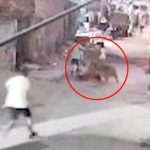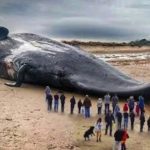1. Kangaroo
The joey, like all marsupials, is born extremely prematurely and is about the size of a cherry. It spends the next six months developing in its mother’s pouch. The joeys’ heads and feet can frequently be seen sticking out of the pouch as they grow. Young kangaroos will instinctively dive for their mother’s pouch even after they have hopped out into the world if they feel threatened.
2. Lion
It takes a cub around a week to ten days after birth to open its eyes. Cubs are born without eyes. By the scruff of the neck, the mother will lift up the cub and hold it tenderly in her mouth. In order to allow the mother to carry it to its new, secure den, the cub will reflexively relax every muscle.
3. Sumarine Toad
Instead of going through a larval or tadpole stage, baby toads emerge from their mother’s back as fully developed, half-inch toadlets after around three to four months. Toads are an excellent illustration of parental care since, when they are sealed inside mom’s back, they are less susceptible to predators. Toadlings just hatching out swim off by themselves.
4. American Alligator
A tremendous level of parental care and investment is shown by American alligators. Mothers frequently protect the eggs throughout incubation, release the young once they hatch, and take them to the relatively safe environment of the water where they will remain under watch for a while….Discover Móre
See The Junkyard In China Where Millions Of Vehicles Are Thrown Away And Scrapped







